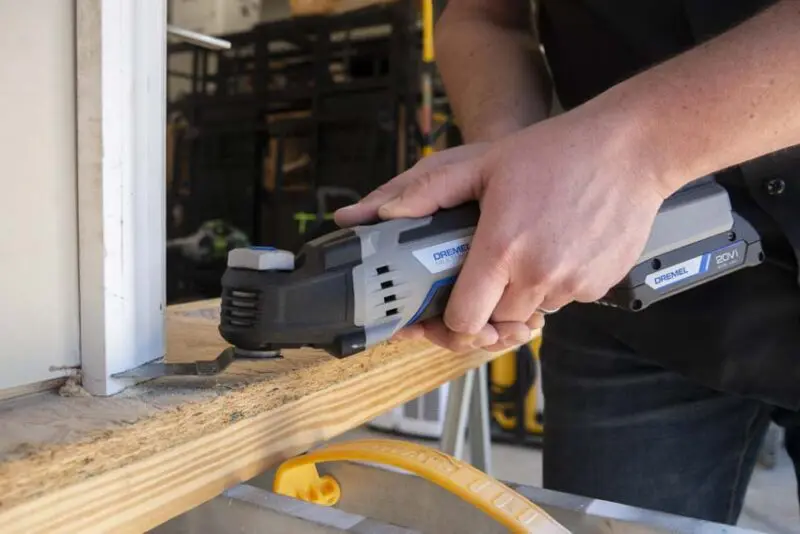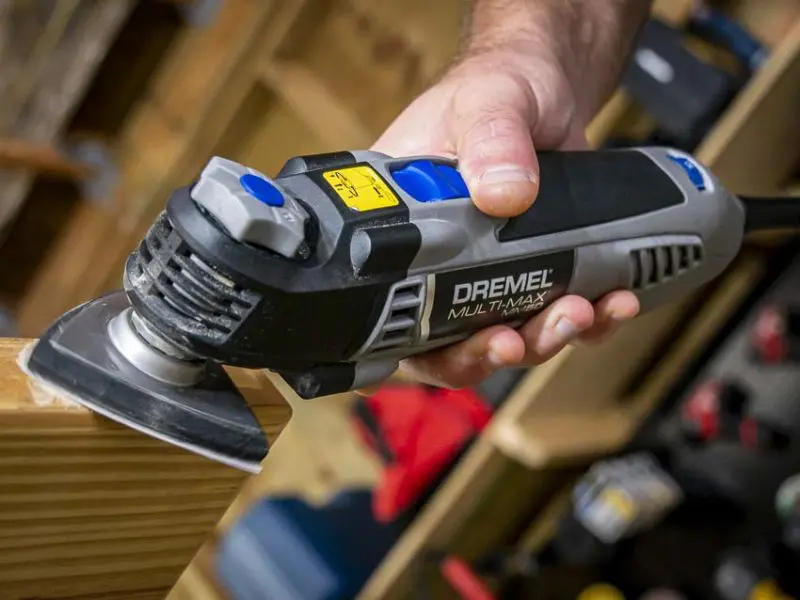Anyone who is even minimally into tools has heard of Dremel (actually a division of Robert Bosch Tool Corporation). They make all sorts of polishing and cutting tools based on a rotary design. When Fein’s exclusive patent on their oscillating tool expired around 2008, other manufacturers like Dremel jumped into the oscillating multi-tool game with the Multi-Max line. In fact, Dremel went first with their 6300 oscillating tool. Now, the brand has three distinct products including two corded and one cordless model.
Best Cordless Dremel Multi-Max Oscillating Tool
Dremel MM20V Cordless Oscillating Multi-Tool

Dremel isn’t known for its cordless tools the way other brands are. They do, however, deliver a solid value in oscillating multi-tools. We got our hands on the Dremel cordless oscillating multi-tool to see how it compared to corded models like the MM45 and MM50.
The Dremel Cordless Multi-Max has a nice overmolded barrel grip. It has a nice consistent width that gives you a secure and comfortable grip. It works well when operating it with either one hand or two.
The cordless Dremel Multi-Max lacks any sort of dust collection. We’ve found that’s not a huge issue with this tool. Just come behind with one of your favorite shop vacuums. Overall, this tool feels pretty rugged. It should work well on the jobsite for undercutting and more. The $149 price gets you a kit with accessories, a charger, and one 20V battery.
Best Dremel Multi-Max for DIY or Home Renovation
Dremel MM35 Oscillating Multi-Tool

If you don’t want to mess around with batteries and need the extended runtime a corded tool offers, the Dremel MM35 does the job. The 3.5-amp Dremel MM35 gives anyone from DIYers to home renovators a moderately powerful tool. Use it to undercut doorways, remove grout, or tackle small sanding tasks.
The affordable Dremel MM35 can help you cut, sand, scrape—even remove rust. Dremel also sells the MM35-01 kit that includes a backer with 9 sanding pads, a jab saw blade, and a wood blade. It all comes in a soft carrying case.
As you might expect from a more refined tool, Dremel gives you a tool-free way to change accessories. You also get the option to adjust speed using the variable speed dial. Speed varies between 10,000 and 21,000 oscillations-per-minute. This tool seems like a great fit for cutting into a variety of woods and metals or even PVC pipe and drywall. At around $99 for the kit, you really can’t go wrong.
Best Dremel Multi-Max for Pros
Dremel MM50 Oscillating Multi-Tool

The Multi-Max line of oscillating multi-tools tops off with the Dremel Multi-Max MM50. More than just bumping up the motor power to 5.0 amps, Dremel adds some key features. Each makes life a little easier for professional users or serious DIYers looking for a reliable multi-tool.
The Dremel Multi-Max MM50 uses a variable speed dial and power switch rather than a trigger system to control speed. It has 10 settings to cover its 10,000–21,000 OPM no-load speed.
We really like the design—the top dial works really well both with or without gloves. Note that the Made in the USA One-Fit Imperial Blades don’t quite fit. The clamp is just a millimeter or two too small. It doesn’t fully engage the blade even though the hole pattern fits. We didn’t have that issue with the Dremel MM45 and its level-action clamp system.
At $139 the Dremel Multi-Max MM50 falls well under the price of most Pro-level multi-tools. That makes it a pretty attractive value in our book, This goes double after the performance we saw during testing.
Changing Accessories on a Dremel Multi-Max Tool
Dremel labels its accessories connection system the “Quick Fit.” It’s actually quite ingenious in its design and works well in execution. Each accessory, with the exception of the hook & loop pads, is slotted, with 9 holes to fit into the 12 raised pins that exist on the Quick Fit system. Because each of the accessories are slotted, this means that the clamping screw and blade washer do not need to be fully removed in order to change accessories. With many other oscillating tools on the market (the new Fein MultiMaster 250Q being one of the exceptions) the central clamping screw and blade washer must be completely removed to change a blade for example. As a result, the Dremel provides one of the fastest accessory changes in the market.
In practical use, we discovered something very important to note: oscillating tools… well, oscillate. This means that if you aren’t careful to securely tighten the clamping screw all the way down, you’ll quickly find it backing itself out and the tool will let go of the blade. Trust us, we speak from experience and even managed to capture it in a series of pictures we took just before we realized what had happened:
Using Dremel Multi-Max Tools with Sanding Pads
Hook & loop pads work well for quick sanding, though a dedicated orbital gives better results. The sanding paper just fit to the edges of the pad and can drift over time when you apply pressure. These pads can wear out prematurely since the sanding area doesn’t extend beyond the boundaries of the pad itself. If you plan on using the Dremel Multi-Max as a precision sander, pick up an additional hook & loop pad just in case.
Testing and Use
We typically test sanding using a particularly tough piece of pressure-treated lumber and a 60-grit pad. While not your typical sanding surface, it gives tools like the Dremel Multi-Max a tough workout in a short amount of time. We focus on control and how it feels when moving it about. We follow specific patterns to see if we can precisely control the tool over the work material. Following up with increasingly smaller grits we see how quickly the tool smooths the surface.
Next, we test using a 3/4-inch wood flush cut blade and plunge the Dremel Multi-Max into a piece of pressure-treated lumber. We see if the blade plunges easily into the wood using a medium speed to get the blade positioned properly. Next, we raise the oscillation speed to the maximum to test our quickest cutting time. Finally, our process checks the blade oscillating angle and, of course, gets a sense of the vibration of the tool during use.

A custom test rig lets us sand, cut through trim nails, remove grout, cut out drywall, and practice additional undercutting. The advantage of this rig is that it lets us do some timed testing and get a feel for these tools in several real-world scenarios.
The Oscillating Motion of a Multi-Tool
Some of our readers don’t know exactly what the oscillating motion is, so we decided to illustrate it with a photo of the tool in motion, using our D-SLR camera. The first picture shows the 60-grit sandpaper at rest, the second is with the tool turned on. If you notice the pattern, you’ll quickly see that the tool pivots the center of the pad (the centerline of the accessory holder) plus and minus 1.5 degrees, for a full 3-degree arc. There is no up-and-down motion, so the tool has minimal vibration while executing lots of smooth, fast action for cutting and sanding
Final Thoughts
Dremel Multi-Max oscillating multi-tools make for irreplaceable solutions when tiling or attempting smaller sanding tasks. While smaller, less powerful tools like the MM35 are powerful enough to handle most finishing jobs. Larger motors, like those in the Dremel M50 do a much better job cutting into wood with flush cut blades.
We love how all Dremel Multi-Max tools use a tool-free blade change system. That lets you swap most accessories without requiring the complete removal of the clamping screw and washer. The Multi-Max kits typically come with basic accessories. Even without, however, we love third-party solutions like Imperial blades or Milwaukee oscillating multi-tool blades (Milwaukee now owns Imperial blades).
With prices starting under $100, the Dremel Multi-Max gives you a bargain no matter what your needs. We recommend these tools for anyone from a DIY novice to a professional needing the occasional undercutting tool for tile installation or renovation jobs.






